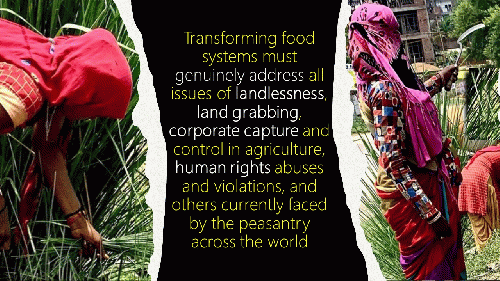While the governments chant the mantra of "leaving no one behind", it is ironic that they are abetting corporate grabbing of land and resources, which is pushing farmers out of agriculture. Corporations are exercising more and more control over food and agriculture and influencing public policies. The forthcoming United Nations Food Systems Summit 2021, tentatively to be held in September 2021 and convened by the Secretary-General of the United Nations, purports to transform the way the world produces and consumes food, and leverage these actions to deliver progress on all the 17 Sustainable Development Goals (SDGs).
However, one fears that with UN Secretary General's Special Envoy to the Food Systems Summit, Agnes Kalibata, running the show, the Summit will promote corporatisation of food systems and corporate control of agriculture. Kalibata is President of Alliance for a Green Revolution in Africa (AGRA) whose role in Africa has been very detrimental to small and landless farmers, women and youth. This shows that the UN Food Systems Summit will bring together extractive policies of neoliberalism (that have been around for nearly three decades) and ensure that not only the production but also consumption of food is kept in the hands of corporations who will be the main beneficiaries of corporate-capture policies, warns Azra Sayeed, Chairperson of International Women's Alliance as well as of Asia Pacific Research Network.
"The global order is at the brink of collapse as there is no sustainable livelihood, let alone decent livelihood. People do not have any social-security network. Along with the climate, economic and food crisis we are now in the grip of a health crisis too. The Covid-19 pandemic has escalated the misery of the people and shown the vulnerability of our current food systems," she says.
Simone Adler, Co-Director of Pesticide Action Network (PAN) North America, gives another example of UN's turncoat policy on a just and equitable food system. In October 2020, UN's Food and Agriculture Organization (FAO) signed a letter of intent to formalize a partnership with CropLife International - a global trade association whose member corporations include the world's largest agrochemical, pesticide, and seed companies. These companies produce and promote pesticides, including highly hazardous ones. More than 35% of CropLife member sales come directly from sale of highly hazardous pesticides. A recent study estimates that there are 385 million cases of acute pesticide poisoning every year. The pesticide companies also export products banned in their own countries to the global south--where their pesticide sales are even higher. So there is every likelihood that this Alliance would impede global efforts to phase out and ban hazardous pesticides by 2030. The Alliance also threatens to undermine people's food sovereignty and profit at the expense of farmers' lives and livelihoods, fears Simone.
FAO is already collaborating with CropLife to dispose off the obsolete stockpiles of pesticides. It is preposterous that a UN agency charged with reducing hunger and supporting farmers and rural communities around the world, formally aligns with an industry that is devastating people and the planet.
There are examples where governments of our countries worldwide have adopted policies as part of UN's legally binding treaty to kick out industry interference from public policy. For example, the global tobacco treaty (formally called the World Health Organization Framework Convention on Tobacco Control or WHO FCTC), which has been ratified by over 180 countries, has strong Article 5.3 to stop tobacco-industry interference in health policy. WHO FCTC also has Article 19 to hold tobacco industry legally and financially liable. We need stronger binding rules to not let industry water down or derail efforts to keep people before profit.
#ToxicAlliance
No wonder activists call it a toxic alliance, as it facilitates pesticide industry's influence on global food systems and goes against UN's mandate for promoting a just and resilient food system. A global campaign called Stop FAO-CropLife #ToxicAlliance, coordinated by Pesticide Action Network Asia Pacific (PANAP or PAN Asia Pacific) and PAN North America, demands that FAO must sever its formal alliance with CropLife International before the UN Food Systems Summit and implement a policy to prevent conflicts of interest. Several organizations and networks representing farmers, fisherfolk, agricultural workers, indigenous peoples, scientists and social-justice organisations from many countries, have written to the Director General of FAO to stop this Alliance, shares Simone.
(Note: You can view every article as one long page if you sign up as an Advocate Member, or higher).






